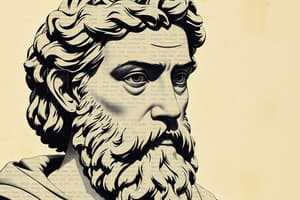Podcast
Questions and Answers
What were Socrates' contributions to philosophy?
What were Socrates' contributions to philosophy?
He shifted philosophy inward, focusing on the mind and developing the idea of universal definition, exemplified in the Republic.
What was Socrates' mission to his fellow citizens of Athens?
What was Socrates' mission to his fellow citizens of Athens?
Socrates aimed to challenge the Athenians to seek out the perfection of the soul, proving their wisdom to be false.
Why did Socrates reject Crito's proposal to bribe the jailer and escape?
Why did Socrates reject Crito's proposal to bribe the jailer and escape?
Socrates believed it was wrong to do harm to others, even when wronged, and that escaping would validate the courts' judgement against him.
What does Plato's divided line illustrate about levels of reality and knowledge?
What does Plato's divided line illustrate about levels of reality and knowledge?
Flashcards are hidden until you start studying
Study Notes
Socrates' Contributions to Philosophy
- Shifted focus from external knowledge to introspection and the mind.
- Introduced the concept of universal definitions, such as the quest for justice in "The Republic."
- Established the Socratic method, emphasizing inquiry through successive questioning.
- Viewed as the foundational figure of Western philosophy, influencing Plato and Aristotle.
Socrates' Mission in Athens
- Sought to challenge Athenians to pursue the perfection of their souls.
- Oracle declared he was the wisest, prompting him to question those perceived as wise.
- Considered himself a divine gadfly, stimulating the citizens to self-reflection and ethical considerations.
Rejection of Crito's Proposal
- Declined to escape from jail, emphasizing morality over public perception.
- Argued that one must never commit wrong, even in response to harm.
- Believed escaping would imply guilt and validate the court's judgment against him.
- Engaged in an imagined dialogue with the laws of Athens, affirming the necessity to obey them as part of a social contract.
- Highlighted that virtue and justice are paramount, and one cannot possess them by breaking laws.
- Concerned about the implications of exile on his relationships and philosophical life.
Plato's Divided Line
- Divides knowledge into four levels based on clarity and truth: noesis, dianoia, pistis, and eikasia.
- Upper segment represents Knowledge and the intellectual realm, while the lower segment signifies Opinion and sensory experience.
- The longer section denotes a deeper understanding, aligning with intellectual pursuits.
- Philosophers focus their attention on the higher realms of noesis and dianoia, pursuing true knowledge.
- Philodoxers, or lovers of opinion, remain in the lower sections, concerned with sensory appearances rather than true understanding.
Studying That Suits You
Use AI to generate personalized quizzes and flashcards to suit your learning preferences.




